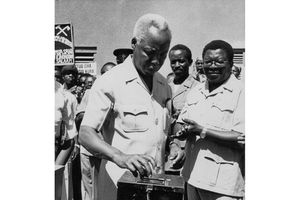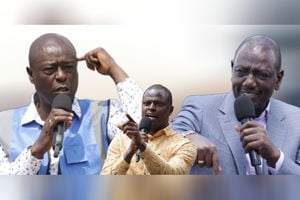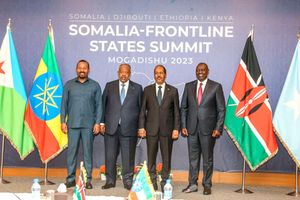
A view of the 35th Ordinary Session of the African Union (AU) Summit in Addis Ababa, on February 5, 2022. Africa badly needs a compelling narrative to defend its resident citizens and diasporas.
I was a guest speaker at a round-table on “the role of information, disinformation and narratives in Euro-Africa relations” hosted by the Embassy of Finland on February 5, 2024.
As one who heads a think tank that is avowedly aligned to a pan-African ideology, my position regarding the raging global battle of narratives has been that Africa should neither align itself to the West or the East but develop its own narrative propelled by the interests of its people, mainly peace, development and poverty eradication.
But one European panellist was taken aback by this ‘Africa-centered’ approach global geopolitics. As I left the venue, I became convinced that if Africa is to survive in the global war of narratives in our multipolar and post-truth world it must revisit and hone its own compelling narrative.
In the last millennium, Africa lost almost all the global battles of narratives, with dire consequences for its people.
First, a Western narrative that depicted Africa as the antithesis of Europe and civilisation and the Africans as racially inferior to Europeans. It was used to justify over 300 years of slave trade where more than eight out of ten Africans were forced to cross the Atlantic between 1700 and 1850.
Second, racist narratives about of Africa such as Henry Morton Stanley’s Dark Continent and Conrad's Heart of Darkness moralised European partition and colonisation of Africa.
Third, after colonialism a new Us-versus-them narrative portraying Africa as the abode of poverty, disease, war and underdevelopment was used to turn development into a geopolitical project. The Western ‘development paradigm’ morphed from an altruistic project to a ‘donor- recipient’ geostrategy that created a narrative of the West as ‘donor’ and Africa aid-receiving ‘underdeveloped’ region.
In the 1980s and 1990s, dubbed “Africa's lost decades”, the development paradigm wreaked havoc on the continent. The World Bank and the IMF imposed the ruinous Structural Adjustment programs, which eroded the economic gains made during the post-colonial years. In 2000, The Economist (May 13) wrote Africa off as a “hopeless continent.”
The rise of China as an economic powerhouse has raised the geopolitical stakes and expanded its footprint in Africa. Russia has used mercenaries and played the role of spoiler to Western interests. This has forced the America-led West to revisit their development narrative and seek a credible alternative to the donor-recipient trope as the lynchpin of their influence in Africa.
A new narrative of the ‘new 21st century scramble for Africa” pitting the US against China and Russia in the struggle to recruit and maintain allies in Africa has emerged. Erroneously, the narrative of the scramble suggests a ‘helpless’ continent. The truth is Africa’s divided response to the Russia invasion of Ukraine revealed a continent able to take a principled stand on competing narratives, a rare diplomatic feat for a subaltern in global geopolitics.
Africa has had a compelling narrative. In the opening decade of the 21st century, the continent effectively challenged the narrative of a “hopeless continent.” Ghanaian economist George Ayittey coined the catch-all phrase: “African solutions to African problems.”
While the narrative was in response to the international community’s role in the Somali crisis, it depicted the spirit of a people ready to take ownership of their destiny.
In a 1996 speech: “I am an African,” former South Africa President Thabo Mbeki popularised the concept of “African Renaissance” as a narrative of the African people seizing their destiny, overcoming the challenges confronting them and achieving cultural, scientific, and economic rebirth. As a result, they replaced the Organization of African Unity with the African Union and adopted “Agenda 2063: The Africa We Want” as a blueprint to deliver inclusive and sustainable development and transform the continent into the global powerhouse of the future. Africa also adopted a ‘look East/look South policy’ to take advantage of the opportunities offered by rising economic powerhouses in the global South.
All this changed the image and narratives about Africa. In December 2011, The Economist described Africa as a “hopeful continent” and coined the term ‘Africa Rising’ as a narrative depicting high economic growth, rising incomes and an emerging middle class.
However, in the post-Covid era, the Africa Rising narrative has declined in the face of escalating global battle of narratives in our multipolar world. A surge of micro-nationalisms has forced pan-Africanism into retreat. In January, Sudan suspended its membership of the Intergovernmental Authority on Development (IGAD). Ethiopia declined invitation to attend the IGAD extraordinary summit in Kampala on January 18 called to discuss regional tensions, including the Somalia-Ethiopia row over a port deal with Somaliland. Niger, Burkina Faso, and Mali withdrew from the Economic Community of West African States (Ecowas) the same month.
The narrative emerging from a combined ‘African renaissance’, ‘Africa Rising’ and ‘African Solutions to African Problems’ is losing to other narratives. Africa now is an arena of the global battle of narratives pitting China and Russia against America and its allies.
Instead of championing pan-Africanism, regional powers like Kenya and Nigeria are promoting ‘Eura-Africanism’ — the idea of strategic partnership between Europe and its former African colonies. Africa is kowtowing to the narrative that the European Union, especially the Green Deal and ‘climate change’. African countries are swinging like a roller coaster from China-phobia to China-philia in response to the impact of Western narratives.
“Alternative facts” are used to create fear of China’s “debt diplomacy’ while the continent is borrowing heavily from Western sources.
Africa badly needs a compelling narrative to defend its resident citizens and diasporas.
- Prof Peter Kagwanja is the Chief Executive at the Africa Policy Institute (API), Adjunct Professor University of Nairobi & Visiting Scholar at the National Defence University-Kenya. This article is based on on-going research.










